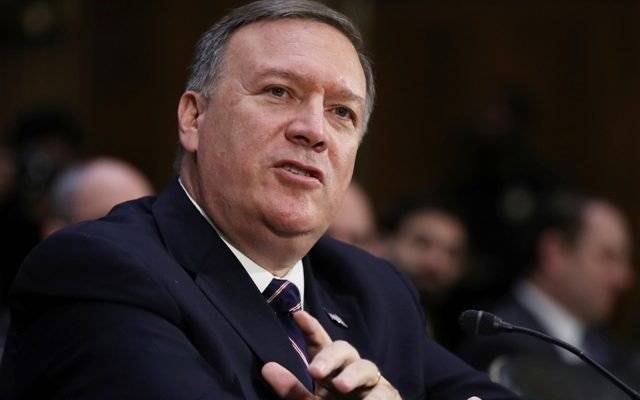U.S. Secretary of State Mike Pompeo pushed back in response to criticism over his remarks that the Trump administration’s Mideast peace plan may not “gain traction” and is “unexecutable.”
By JNS
U.S. Secretary of State Mike Pompeo pushed back on Monday in response to criticism over his remarks last week in a private meeting with Jewish leaders, audio of which was leaked to and reported by The Washington Post on Monday, that the Trump administration’s Mideast peace plan may not “gain traction” and is currently “unexecutable.”
In Switzerland, where he is holding talks with European leaders, Pompeo told Sinclair TV that he was only “articulating” context in a closed-door meeting with the Conference of Presidents of Major Jewish Organizations, and that the notion the administration’s highly anticipated peace proposal to solve the Israeli-Palestinian conflict will be one-sided in favor of Israel is “inaccurate” and “fundamentally untrue.”
“We have a deep, long relationship with Israel—an important relationship with Israel—and the president has made very clear that that’s important to this administration to have that important political, economic and security relationship with Israel,” he said. “And we’ve struggled more with respect to the Palestinians. … So I can see how someone might be concerned that a plan that this administration put forward might, without knowing the true facts of what is contained in the plan, they might perceive that it was going to be fundamentally one-sided. And I was articulating that there because it’s just simply not true.”
Pompeo added that he has not yet spoken to U.S. President Donald Trump about the leaked footage.
“[The peace plan] may be rejected. Could be in the end, folks will say, ‘It’s not particularly original; it doesn’t particularly work for me.’ That is, ‘It’s got two good things and nine bad things; I’m out,’” said Pompeo in the audio recording.
“The big question is can we get enough space that we can have a real conversation about how to build this out,” he said. “This has taken us longer to roll out our plan than I had originally thought it might—to put it lightly.”
In response to the sentiment that the peace deal will favor Israel more than the Palestinians, Pompeo said, “I get why people think this is going to be a deal that only the Israelis could love. I understand the perception of that. I hope everyone will just give the space to listen and let it settle in a little bit.”
Even Trump echoed Pompeo’s sentiment on Sunday.
“We’ll see what happens,” Trump told reporters before leaving for an official visit to the United Kingdom. “We’re doing our best to help the Middle East.”
“If we can get a Mideast peace plan that would be good,” he added. “And when Mike says that, I understand when he says that, because most people think it can’t be done. I think it probably can. But as I say often, we’ll see what happens.”
When the peace plan will be released is yet to be determined, a Trump administration official told JNS on Thursday.
“The Bahrain workshop will go on as scheduled, June 25-26,” said the official in an email. “As far as the rest of the plan/roll-out, we’ve long said that we will release the plan when the timing is right.”
Kushner said in April that the so-called “deal of the century” would be released after Ramadan, which concludes on June 4.
The Bahrain workshop is the first part of the peace proposal roll-out and is expected to deal with revitalizing the Palestinian economy.
The second part is expected to deal with the political issues surrounding the conflict, including geographic boundaries.










